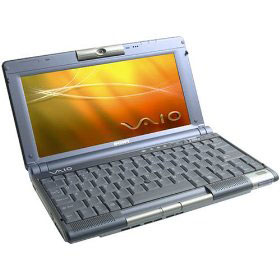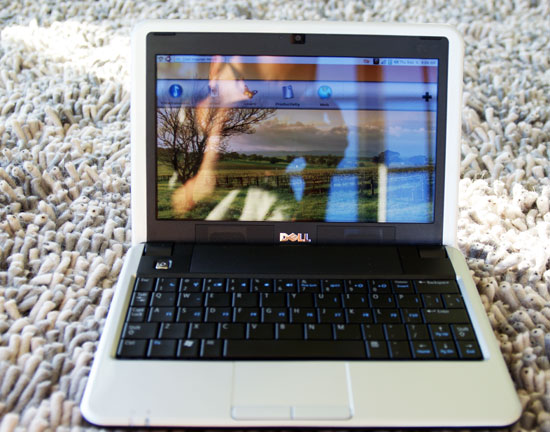Dell Inspiron Mini 9 Reviewed: Refining the Netbook Market
by Anand Lal Shimpi on September 4, 2008 12:00 AM EST- Posted in
- Laptops
Around 6 years ago I owned a Sony Picturebook C1VN. It was based on the horrendously slow Transmeta Crusoe TM5600 CPU, running at 600MHz - at the time it was about as fast as a desktop Celeron 400MHz.

Ah, my beloved Picturebook...how slow you were
(true story, some Intel folks made fun of me for pulling it out at IDF one year before Centrino hit)
The Picturebook was the first ridiculously impractical, but awesomely small notebook I ever owned. It was a pain to type on, slow and the screen was too cramped to get any serious work done. The size was its biggest selling point and for that you paid a premium, over $2,000 if I remember correctly, for the slowest, most impractical notebook you could buy at the time.
In my review of the ASUS Eee Box I talked about this idea of "fast enough" computers. That our desktop (and mobile) hardware has gotten so fast that it's paved the way for an entirely new category of computer, a machine that's not the fastest, but fast enough for things like web browsing and cloud computing. These days it's real easy to have all of your frequently used data stored in the cloud; emails in Gmail, documents online with Google Docs and all of your photos are already online if you like sharing them. You don't need an 8-core Nehalem to get access to your content stored in the cloud, you just need something fast enough.
Intel built its first "fast enough" processor, it's called Atom. Eventually we'll see Atom in smartphones but today it's in computers and mobile internet devices (MIDs). Combine this idea of fast enough hardware with the form factors that were popular during the Picturebook days and you get the netbook.
ASUS really kicked off this latest infatuation with netbooks with its Eee PC, but it’s sort of like what happened when Apple released the MacBook Air. Super thin, ultra portable notebooks had been released for years but since a company as high profile as Apple was now in the game it’s now exposed to a whole new crowd of people.
ASUS made tremendous headway with the Eee PC, bringing a notebook to users who had previously never heard of ASUS much less have any clue how to pronounce the name (AH-soose). But if it was ASUS who helped to create this recent phenomenon, it’s Dell that will make it popular.
Making the Case for Ultra Portables
It's called the Inspiron Mini 9 and it's Dell's entry into the netbook market. Make no mistake, ASUS was the driving force behind the Inspiron Mini 9. Even the naming is ASUS-inspired (the Inspiron Mini 910 vs. the Eee PC 901?). Despite ASUS' head start, Dell had the luxury of watching from a distance and improving where ASUS had failed to make enough changes.

I hate quoting the same review twice on one page but again, in the Eee Box article, I mentioned that it was the type of machine that if you had to ask yourself why you needed one, you probably didn't need to buy one. The Mini is quite similar. It's not practical enough to be a serious workhorse computer, it's what I would view as a 2nd, 3rd or 4th machine. It's something you add to the stable, not the only toy in the arsenal. Dell is even offering a promotion where they'll sell you a Mini for $99 if you buy it alongside some of its notebooks.

It's cute.
I've got a friend, her name is Anne, she works at Dell. I've worked with Anne for years, dating back to when I was still in highschool actually and while going over the Inspiron Mini 9 she recounted a story about her daughter. If you work for Dell and have children, I'd expect you'd get asked for free notebooks all the time. Anne does. She got her daughter a new Dell Studio notebook, but all her daughter does on it is browse the web and update her Facebook profile. Anne views the Inspiron Mini as the perfect notebook for her daughter, and I think I do too.
It's the kind of computer you'd take with you around town to browse the web on, but not for serious work. Writing quick blogs, posting on Facebook walls, IMing, catching up on Digg, are all things you could just as easily do on a smartphone - but it's easier to do on a netbook.
The netbook market exists because the perfect notebook/smartphone device hasn't been made yet. Notebooks aren't thin enough and smartphones aren't big/fast enough. The ultimate, ultra-thin Star Trek tablet just hasn't been invented yet and I suspect it's because we not only lack the UI but the hardware for it.
The Mini and netbooks like it are designed to fill a niche in your computing life, not to dominate it. With that established, let's look at the $349, 2.28 lbs, Dell Inspiron Mini.










55 Comments
View All Comments
strikeback03 - Friday, September 5, 2008 - link
Well, that is assuming they use the same capacity cells. Which given that the 6-cell battery in my T43 was originally rated at 54Whr and not the 48 of the Eee, might not be a perfect assumption.srue - Thursday, September 4, 2008 - link
Yes. Stay in school, kids.JarredWalton - Thursday, September 4, 2008 - link
Next thing you know people are going to try to claim that 48 Whr is 50% more than 32 Whr.... ;-)bohhad - Thursday, September 4, 2008 - link
this thread almost brings a tear to my eyepervisanathema - Thursday, September 4, 2008 - link
Do want. This is what I have been waiting for.